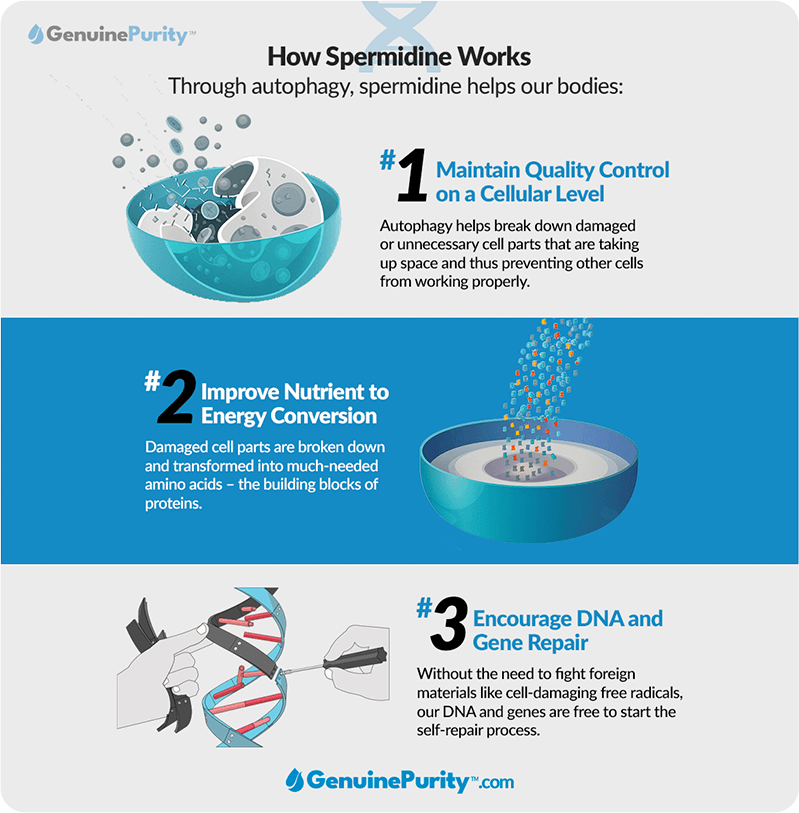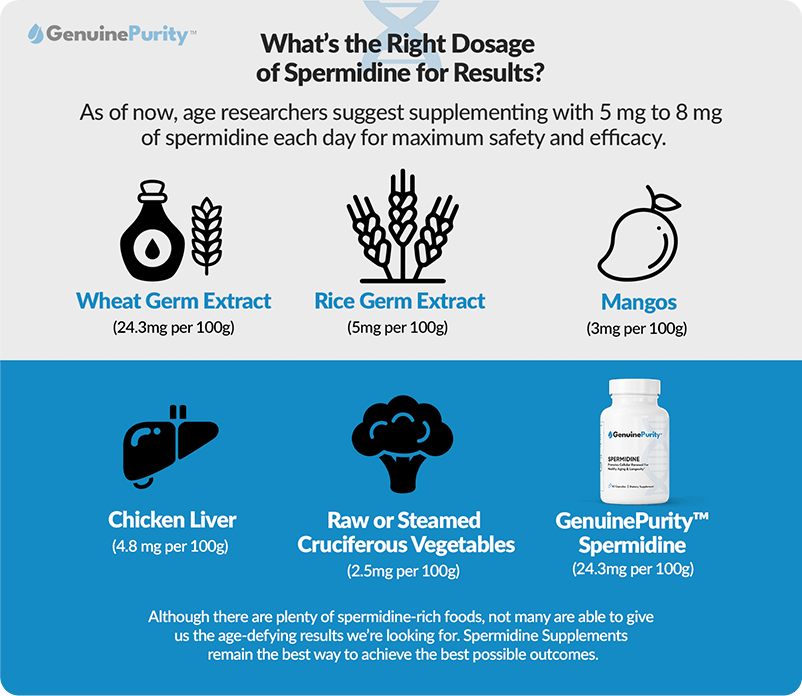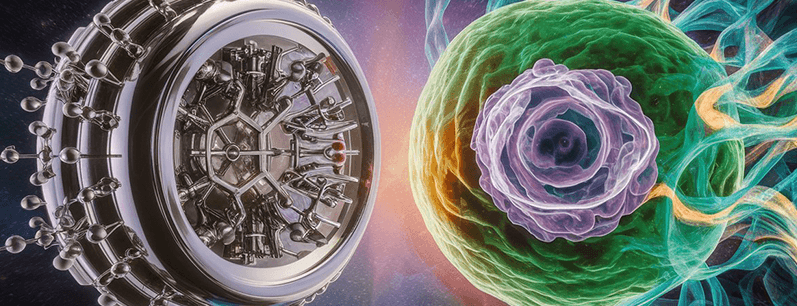At GenuinePurity™, we’re committed to your overall well-being. Today, we’re going to focus on some new insights on spermidine based on collective scientific evidence. We’ll take a deep dive into:
Spermidine is a naturally occurring micronutrient that offers a powerful anti-aging punch. From cell rejuvenation to keeping oxidative stressors at bay, spermidine plays a critical role in how we age on a cellular level.
Age researchers are convinced that spermidine could be the key to keeping us healthy longer and suggest spermidine may even have the ability to extend our lifespan. While those might seem like pretty bold claims, there is science behind spermidine to support them.1
Spermidine has been shown to exhibit:
Spermidine is primarily found in the gut microbiome. However, as we get older, the concentration of spermidine within our bodies naturally falls by the wayside. Supplementing our diet with spermidine-rich foods like wheat germ can go a long way toward restoring that balance.
But getting enough from food sources alone may not provide the age-defying benefits you’re looking for. Spermidine supplements offer high doses of this potent anti-aging compound for potential pro-longevity effects.
At GenuinePurity™, we’re committed to your overall well-being. Today, we’re going to focus on some new insights on spermidine based on collective scientific evidence. We’ll take a deep dive into:
If you’re at all interested in taking a proactive approach to optimizing your health now and into the future, spermidine could be the anti-aging compound for you. Let’s find out.
The Origins of Spermidine: A Natural Anti-Aging Compound
Spermidine was first discovered in 1678 by a man named Antonie van Leeuwenhoek.2 However, it wasn’t until the 20th century that spermidine was structurally classified as a polyamine – a molecular compound belonging to more than 2 amino groups.
Polyamines are physiologically important because they:3
Spermidine is actually a polyamine compound that belongs to 3 amino groups. It has high biosynthesis abilities, making it an ideal molecule for encouraging the formation of various proteins throughout the body.
While spermidine was originally isolated from semen, the naturally occurring polyamine can be found throughout the body in ribosomes and other living tissue. Spermidine has a wide range of benefits for cell synthesis, function, and overall survival.
In addition, spermidine has been shown to have the following benefits:
These days, the active ingredient in spermidine supplements comes from natural sources such as wheat germ – one of the purest forms available. However, you may also find synthetic spermidine, which mimics the chemical structure of natural spermidine. Synthetic spermidine could be an option for those with gluten or wheat allergies.
We know that spermidine plays a critical role in many of our biological functions, but does it delay aging in humans? Let’s take a look.
Does Spermidine Delay Aging in Humans? A Look at the Research

The short answer is yes.4 However, the long answer is slightly more complicated. Spermidine has been clinically studied for its complex position in an array of processes. Age researchers understand the intricacies associated with the compound’s effects on cellular upkeep.
Here’s what we know so far based on over 75000 research papers having been written on the subject:5
When you add up all the facts, it’s clear – spermidine has the potential to delay and possibly reverse aging in humans. Spermidine is a powerful polyamine that works on more levels than we’ve yet to fully understand to achieve anti-aging effects.6
Maintaining optimal spermidine levels as we get older could be the “elixir of life” tool we humans have been searching for. Spermidine supplements, for example, have been shown to positively impact:
In addition to having a positive effect on various physiological mechanisms, spermidine is able to minimize age-related cell malfunctions within our bodies. Spermidine is a bio-active compound that helps regulate cellular aging by combating:
Because spermidine influences aging through such diverse mechanisms, it is equipped to address cellular aging on a multi-faceted level. Supplementing with spermidine could encourage a better healthspan and extend the overall lifespan of the average aging adult.7
The Science Behind Spermidine: How Does It Work?

What we currently understand about polyamines is already changing the way we think about aging. And spermidine is a potent polyamine that offers some serious antioxidative effects for a broad spectrum of species. However, more human studies need to be done to determine how the anti-aging mechanisms of spermidine work on a cellular level.
There is a vast array of studies being done looking at the possibilities that spermidine has to offer. Some of those include:
Because spermidine is such a versatile molecule belonging to 3 unique amino groups, the wellness possibilities are virtually endless. At GenuinePurity™, we’re committed to staying up-to-date on the latest cellular aging applications. We’re excited to see what’s on the horizon for spermidine supplements as more research on the subject comes to light.

As we mentioned, autophagy plays a key role in waste management when it comes to the cells in our bodies. Autophagy helps break down damaged or unnecessary cell parts that are taking up space and thus preventing other cells from working properly.
Once these damaged cells are broken down, the second stage of autophagy occurs. In this stage, cell parts are repurposed to either build new cells or repair cells for the collective health of the group.
By repairing cells that aren’t functioning at full capacity, autophagy helps the body avoid the premature deterioration and aging of cells.

As we mentioned, autophagy plays a key role in waste management when it comes to the cells in our bodies. Autophagy helps break down damaged or unnecessary cell parts that are taking up space and thus preventing other cells from working properly.
Once these damaged cells are broken down, the second stage of autophagy occurs. In this stage, cell parts are repurposed to either build new cells or repair cells for the collective health of the group.
By repairing cells that aren’t functioning at full capacity, autophagy helps the body avoid the premature deterioration and aging of cells.

Spermidine is uniquely positioned to trigger autophagy via metabolic processes such as mitochondria. Autophagy has another important role in our cell function, too. As a regulatory process, autophagy is equipped to help keep DNA and genes healthy and stable.
It does this by preventing damage to cells caused by unstable molecules and eliminating toxic substances. By decreasing oxidative stress markers like harmful free radicals, disease-causing pathogens, and toxins, autophagy helps maintain cell stability.
But spermidine doesn’t just keep cells safe from oxidative stressors. Without the need to fight foreign materials like cell-damaging free radicals, our DNA and genes are free to start the self-repair process.
How Long Does It Take for Spermidine to Build in Your System?

The amount of time it takes for spermidine to build depends on a variety of factors. Your age, your lifestyle habits, and your overall health can all affect the current levels of spermidine in your system. So, it only makes sense that individuals respond differently to supplementing with spermidine.
We do know that spermidine naturally decreases with age. We also understand that for cell rejuvenation to occur, we need a healthy concentration of spermidine. Supplementing with spermidine sooner rather than later should yield faster results.
For the average aging adult, spermidine tends to encourage cell autophagy within just a few weeks time. While you may not physically see the anti-aging effects of spermidine supplements, they’re continuously working on a cellular level to rejuvenate and repair damaged cells.
Spermidine tends to have compounding effects. Oxidative stress is prevented, giving cells the ability to self-repair. Once cells are working at optimal levels, spermidine helps maintain maximum functionality through the regulatory process known as autophagy.
If you keep supplementing with spermidine, you should keep seeing the positive outcomes. Otherwise, healthy adults who replenish spermidine loss with supplements often report gradual yet progressive results over the course of four to six weeks.
But if you truly want to see results from spermidine, dosage is equally as important as making the decision to supplement itself. So, what is the right dosage of spermidine for results? That’s a complicated question with an even more complicated answer worth discussing.
What is the Right Dosage of Spermidine for Results?

Spermidine is primarily naturally occurring within the body. However, age-related spermidine decline can cause us to seek outside sources of the potent compound. Although there are plenty of spermidine-rich foods, not many are able to give us the age-defying results we’re looking for.
There isn’t currently an agreed-upon amount of spermidine that’s scientifically proven to effectively combat age-related decline. As more long-term clinical studies emerge, that should change in the very near future.
As of now, age researchers suggest supplementing with 5 mg to 8 mg of spermidine each day for maximum safety and efficacy. The right dosage of spermidine for results should vary based on body weight and individual circumstances. Speak with a healthcare professional to determine what’s right for you.
Let’s take a look at what foods contain spermidine and at what dosages:14
As you can see, 100% wheat germ has the highest amount of natural spermidine. That’s why manufacturers of spermidine supplements often use wheat germ extract for their products. It’s an all-natural option that offers a wide range of benefits, but is this organic version of spermidine the best? Let’s find out.
Synthetic Spermidine Vs. Organic Spermidine: Which is Best?

Synthetic spermidine is a cheaper alternative that some manufacturers are opting to put in their supplements. However, while being cheaper, it does come at a cost – efficacy. You need a much higher dosage of synthetic spermidine to trigger autophagy.
The body prefers organic compounds. Why? Simply put, they’re easier to digest and metabolize. Organic spermidine is likely your best bet for achieving real age-defying results. Look for products that offer 100% wheat germ extract within their formula.
Note: For those who have wheat allergies, organic is still a better option. However, you may want to seek out products that contain rice germ instead.15
How to Take Spermidine for Best Results
Taking spermidine the right way is important if you want to see the positive effects. While each spermidine supplement has its own formulation and suggested use, there are a few things you can do to ensure maximum efficacy. Those include:
If you are currently on any medications that may interact with spermidine, consult your doctor before starting supplementation. In addition, spermidine may not be ideal for women who are pregnant or nursing.
What are the Benefits of Spermidine?

The anti-aging benefits of spermidine are undeniable. This powerhouse compound offers a wide range of biological advantages to help us win the fight against aging on a cellular level. But you may be surprised to learn some of the general health benefits of spermidine, too.
In addition to promoting optimal cell function through autophagy, spermidine acts as an advocate for our overall well-being by:
It’s obvious that spermidine has a plethora of health benefits that can prolong our healthspan. By taking a proactive approach to our longevity, supplementing with spermidine could be the tool we need to live longer, happier, and healthier lives.
What are the Side Effects?
There are no known side effects associated with spermidine. This naturally occurring compound has been shown to be well-tolerated among those who have taken it in varying clinical studies. Spermidine supplements that are manufactured using organic food sources have the best safety profile.
While side effects with spermidine are few and far between, there are several potential risk factors for certain individuals considering spermidine supplements.
Spermidine supplements are not recommended for:
In addition, spermidine supplements could potentially have negative interactions with prescription medications, including certain antidepressants and blood thinners (Clopidogrel). Consult a medical professional before opting for spermidine supplements if you have any underlying health concerns.
Can You Combine Spermidine with NMN?
Yes – you can combine spermidine with NMN for enhanced anti-aging effects. But, to achieve optimal outcomes, you’ll need quality supplements that use quality ingredients. Why? Because the synergistic effects are only possible when the specific raw materials are combined.22
Here’s what you need to know before opting to combine spermidine with NMN:
- NMN should be sourced from 90%+ pure Nicotinamide Mononucleotide form of Vitamin B3 to naturally increase NAD+ levels.
- Spermidine supplements should contain 100% natural wheat germ extract for optimal autophagy support.
- Both supplements should contain bio-enhancers to ensure maximum efficacy on their own and when combined.
When you combine spermidine with NMN, you can promote a healthier general well-being and a longer lifespan. But be sure to do your due diligence before stacking supplements.
- 250 mg to 750 mg of NMN is generally deemed safe and effective.
- Spermidine supplements typically range from 5 mg to 10 mg dosages.
If you are considering whether you should combine spermidine with NMN, you’re not alone. Many health enthusiasts are turning to top-tier GenuinePurity™ supplements for a compounding anti-aging combo that will take their health to the next level and beyond.
Is Spermidine the Anti-Aging Compound You Should Be Taking?
While we hope that we’ve given you some new insights on supplementing with spermidine, that’s a decision only you can make for yourself. At GenuinePurity™, we offer a wide range of exclusive scientifically substantiated anti-aging supplements for almost every situation.
Our GenuinePurity™ Spermidine supplement offers:
At GenuinePurity™, we believe in making the latest scientific breakthroughs in health and longevity accessible and beneficial to you. Stay up-to-date on the latest news and research regarding anti-aging, cellular health, and everything in between.
Endnotes
- https://karger.com/ger/article/60/4/319/147786/Molecular-Basis-of-the-Anti-Aging-Effect-of
- https://pubmed.ncbi.nlm.nih.gov/20095966/#:~:text=The%20polyamines%2C%20spermidine%20and%20spermine,1678%20by%20Antonie%20van%20Leeuwenhoek.
- https://www.sciencedirect.com/topics/neuroscience/polyamine
- https://www.ncbi.nlm.nih.gov/pmc/articles/PMC6128428/
- https://pubmed.ncbi.nlm.nih.gov/20095966/#:~:text=The%20polyamines%2C%20spermidine%20and%20spermine,1678%20by%20Antonie%20van%20Leeuwenhoek
- https://karger.com/ger/article/60/4/319/147786/Molecular-Basis-of-the-Anti-Aging-Effect-of
- https://www.ncbi.nlm.nih.gov/pmc/articles/PMC8612618/#:~:text=The%20concentration%20of%20spermidine%20declines,longevity%20%5B8%2C%209%5D.
- https://www.ncbi.nlm.nih.gov/pmc/articles/PMC10117651/
- https://www.mdpi.com/1999-4923/14/7/1500
- https://www.sciencedirect.com/science/article/abs/pii/S1871403X21000958
- https://www.nature.com/articles/s43587-023-00495-x
- https://www.ncbi.nlm.nih.gov/pmc/articles/PMC3144892/
- https://www.ncbi.nlm.nih.gov/pmc/articles/PMC4644734/
- https://www.ncbi.nlm.nih.gov/pmc/articles/PMC6637774/#:~:text=The%20food%20categories%20with%20the,spermine%20(37%2C%2059)
- https://www.medicalnewstoday.com/articles/316167
- https://www.ahajournals.org/doi/10.1161/CIRCRESAHA.117.310603
- https://examine.com/research-feed/study/1JXpE9/
- https://www.sciencedirect.com/science/article/pii/S1550413120304253
- https://www.ncbi.nlm.nih.gov/pmc/articles/PMC9028953/
- https://www.ncbi.nlm.nih.gov/pmc/articles/PMC10117651/#:~:text=spermidine%20specifically%20interferes%20with%20the,by%20regulating%20key%20oncologic%20pathways.
- https://aor.ca/nmn-wheat-germ/#:~:text=Why%20NMN%20and%20spermidine%3F,are%20clean%20and%20damage%20free

